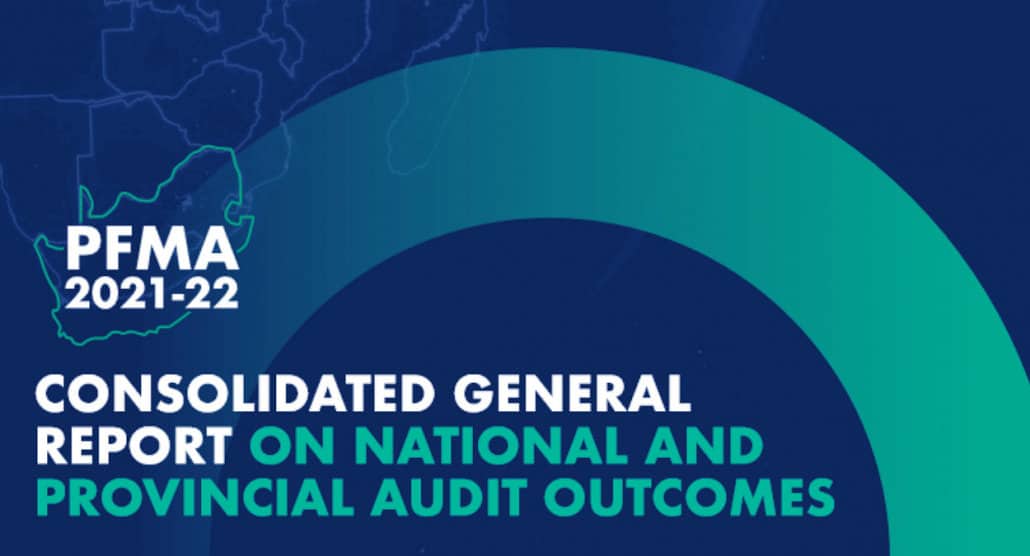Auditor-General Tsakani Maluleke’s extended powers are starting to bear fruits, with more positive responses from provincial and national departments. She warns, however, that proper oversight and accountability measures remain a challenge, with only 6% of departments and other audited entities obtaining clean audits.
Maluleke released the latest audit outcomes for the 2020/21 financial year on Wednesday 23 November 2022, citing a R12-billion loss across departments due to material irregularities flagged by her office.
“At this early stage, I am pleased with the impact we are making through the implementation of this expanded mandate – as demonstrated through the increased attention given to our audit process and outcomes, action being taken to address our findings, and the prevention or recovery of financial losses by accounting officers and authorities,” she said in a statement accompanying the report.
The Public Audit Amendment Act, which came into effect in 2019, allows the Auditor-General of South Africa (AGSA) more powers that include referring material irregularities by auditees to relevant bodies for investigation. While Maluleke has hailed many of the entities governed by the Public Finance Management Act (PFMA) for responding more proactively to the auditing process than before, there were still challenges.
“By 31 August 2022, we had notified accounting officers and authorities of 179 material irregularities (MIs) in the national and provincial spheres of government. Most of the MIs identified were caused by non-compliance and suspected fraud which resulted in, or are likely to result in, a material financial loss. We estimate the total financial loss of these MIs to be R12-billion.”
Losses prevented through stronger internal controls
It’s not all doom and gloom, Maluleke adds, as departments continue to resolve MIs by “recovering losses, preventing further losses and harm through strengthening internal controls, and effecting consequences for transgressions.”
“We have noted that there were no actions taken to address 82% of the matters raised until we issued notifications of material irregularities,” Maluleke adds.
“Through the process, financial losses of R636-million were prevented from taking place, R14-million in financial loss was recovered and R509-million in financial loss is in the process of being recovered.”
Some 36 cases of officials being held accountable and disciplined for their part in the financial losses were noted, while 15 fraud and criminal investigations have been instituted and five supplier contracts have been stopped.
More clean audits
Maluleke says her office has seen an increase of clean audits every year, which is encouraging. This she attributes to efforts from both the leadership of audited entities as well as the bodies that oversee them. However, 128 auditees – 56 departments and 72 public entities with a clean audit status – represent only 6% of the R2.58-trillion expenditure budget managed by national and provincial government.
State-owned enterprises continue to struggle with complying with the requirements for their financial statements. “By 15 September 2022 – the cut-off date for audit outcomes to be included in the latest report – the audits of 26 auditees had not been completed.
“Fifteen of these auditees (58%) – most of them state-owned enterprises – had not yet submitted their financial statements at this date. Six of the auditees (23%) submitted their financial statements late, which delayed the completion of their audits. The remaining five outstanding audits (19%) were also delayed by the auditees for different reasons.”
Fruitless and wasteful expenditure
Over and above the R12-billion material irregularities incurred, Maluleke noted, auditees have disclosed fruitless and wasteful expenditure totalling R5.83-billion over the period since 2019. She identified the following as reasons for the high losses:
- poor payment practices to suppliers for goods and services;
- unfair or uncompetitive procurement practices when acquiring goods and services;
- no or limited benefits received for money spent and properties owned;
- infrastructure not maintained and secured;
- uneconomical practices for leasing properties;
- inadequate needs analysis and project management.
“Contracts awarded to suppliers must be actively managed to ensure that the suppliers deliver at the right time, price and quality before any payments are made,” she added. “Payments must also be made on time to avoid interest and penalties. Such requirements are not only standard financial management practices; they are also included in the PFMA.”
In terms of procurement, AGSA found that non-compliance with procurement and contract management legislation at auditees continued to be a challenge including at all key service delivery portfolios – education, health and human settlements – and at 16 state-owned enterprises. In 2021-22, auditees disclosed irregular expenditure of R51.22-billion, but the figure could be higher, as not all irregular expenditure was reported in financial statements.
“In some cases, the amount of irregular expenditure reported was incorrect. The AGSA could also not audit contracts worth R2.53-billion because of missing or incomplete information.”

